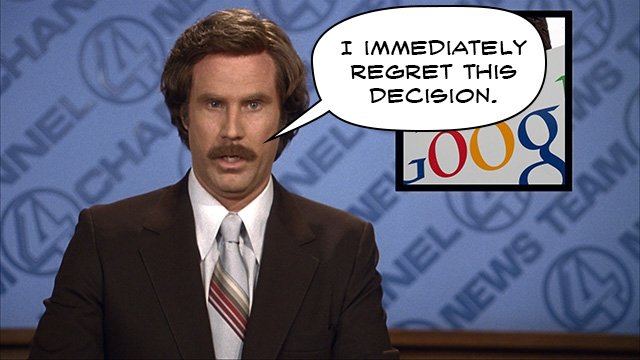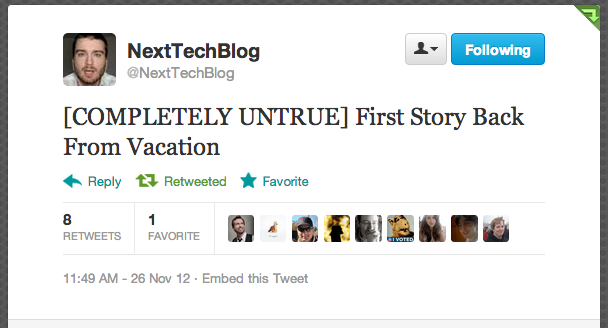
If you're the kind of person who obsessively reads technology news stories, this morning you might have seen about a dozen headlines touting a $400 million Google acquisition of a Wi-Fi hotspot provider called ICOA.
The stories were all attributed to an announcement made by Google. The only trouble is, Google didn't make the announcement at all. And ICOA now says the story is entirely false.
Oops
So how did this story get so widely distributed? The answer is media outlets writing about it didn't contact Google or ICOA before pumping out their stories, relying solely on a press release that didn't come from either company. ICOA's stock (worth less than a penny) soared on the fake news and then, just as suddenly, fell back down to earth. This leads to the natural assumption: someone must be profiting off this little mess.
"This is absolutely false!” ICOA CEO George Strouthopoulos told TechCrunch in an e-mail. "Someone, I guess a stock promoter with a dubious interest, is disseminating wrong, false, and misleading info in the PR circles.” A story in BuzzFeed quotes Strouthopoulos as saying the source of the hoax is from Aruba. The Securities Exchange Commission has reportedly halted trading on ICOA's stock at ICOA's request.
TechCrunch's original story, titled "Google Acquires US National High-Traffic Broadband Wi-Fi Provider ICOA Inc. For $400M," has been updated to blame "a PR agency or some other individual gone rogue."
But TechCrunch was far from the only one duped. This is the kind of story that leads to headlines like "Google pays $400 million for wireless internet provider ICOA (update: no it didn't)." Even the Associated Press was fooled, and that untrue AP story was left on the Washington Post website and elsewhere for a couple of hours before being removed.
It was great material for anyone who likes to parody the tech media, such as one of my favorite Twitter accounts, @NextTechBlog:

The press release that caused this whole thing was published on a site called PRWeb and nowhere else. Neither Google nor ICOA made any announcement on company sites. Vocus, which runs PRWeb, doesn't reveal exactly who submits press releases to them. It also doesn't check for accuracy. When I spoke to someone who answered the phone in Vocus's editorial services department, I was told "We don't go out and vet their sources. We make sure there's nothing damaging to their business and ours." They also check for grammatical errors. The link to the press release is now redirecting to the PRWeb home page.
Seems legit
The release was just two paragraphs, and it listed ICOA's website and phone number as contact information. It provided some quick facts about how great ICOA technology is, then said Google made the buy to "diversify it's already impressive portfolio of companies."
News is often reported quickly when the original source appears to be legitimate, often without contacting every possible source. ICOA builds Wi-Fi hotspot infrastructure in airports and other public places. Google has Google Fiber Internet-to-the-home in Kansas City, offers free Wi-FI in its hometown of Mountain View, CA, and sponsors Boingo hotspots in many locations. Buying a maker of Wi-Fi hotspot technology seems like it would fit into Google's natural progression.
I admit I was fooled too, at first. But there were some red flags beyond just grammatical errors in the press release.
The press release was titled "ICOA Inc. Acquired by Google for $400 Million," and the first two sentences say "Google has announced its acquisition of ICOA Inc. A provider of Wi-Fi to high traffic public locations." (Yes, those are two sentences, but a properly placed comma could have made the whole thing grammatically correct.)
The magic words "Google has announced its acquisition" were enough for many news stories to report the deal was announced from on high by Google itself. But when Google announces acquisitions, it typically does so with a press release on Google.com and with a blog post on its official blog. In this case, Google did neither.
The thing that really puzzled me was why Google would buy ICOA rather than some other, more successful company (like, I dunno, Boingo). ICOA's website is severely out of date, quoting 1,500 broadband access installations "as of January 1, 2006." The company announced a Wi-Fi roaming agreement for airports with Boingo in 2004 and a deal with Denny's restaurants in 2006. But things weren't going so well. In October 2010, ICOA said it was developing a new business strategy to adapt to the "changing dynamics within the Wi-Fi industry," and hasn't issued any press releases at all since December 2010.
I e-mailed Google to ask why it would buy ICOA, but did not receive any on-the-record response, not even a confirmation that the acquisition took place. This alone wasn't proof that Google hadn't at least talked to ICOA about an acquisition. That would come later, when Strouthopoulos told TechCrunch his company "Never had any discussions with any potential acquirers."
Companies often decline comment on acquisitions when they are still pending and being negotiated. A non-denial denial isn't enough to prove something is untrue. But the story media outlets were running with was that Google announced an acquisition. That was demonstrably false. After an hour or two of the story being repeated unskeptically, some slightly more definitive word came from AllThingsD, which credited Google sources with saying the whole thing was a lie.
So was there some stock fraud going on here, as the ICOA CEO suspected? We don't know for sure, but releasing false news to raise a stock price would certainly lay the groundwork for a classic pump and dump scheme.
Publishing a fake press release would also be a good way to prove how easy it is to fool reporters. It wouldn't be the first time. Just last year, many tech media sites published stories about a study purportedly showing that Internet Explorer users have lower IQs than users of other browsers. (Spoiler alert: it was a hoax.)
No one's perfect. But a few minutes of digging, Google searching, e-mailing, and phone calling is usually enough to prevent false news from hitting the wire.
reader comments
36